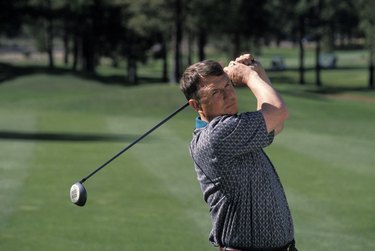
The rotator cuff is a group of muscles in the shoulder girdle that stabilize and move the arm through its full range of motion. Rotator cuff injuries are common in golfers, according to the Hughston Health Alert, and the type of treatment depends on the severity of the injury. Some rotator cuff tears may heal with time, while others may require surgery. It is possible to play golf with a rotator cuff injury, but it requires special care.
Step 1
Rest and immobilize the joint. The Mayo Clinic advises against activities, including golf, during the first few weeks of the injury. Allow the tear time to heal; otherwise, you may make the injury worse.
Video of the Day
Step 2
Get physical therapy. A physical therapist can prescribe exercises to strengthen the rotator cuff muscles, speed recovery and prevent further injury.
Step 3
Take over-the-counter nonsteroidal anti-inflammatory drugs. The Mayo Clinic recommends aspirin, ibuprofen, acetaminophen or naproxen. Follow the manufacturer's instructions for dosing and either take the drug after your game or before as a preventive measure.
Step 4
Consult your doctor about cortisone shots. Cortisone is a steroid that brings down inflammation and is commonly used to treat rotator cuff injuries.
Step 5
Apply ice and heat. Ice brings down inflammation while heat reduces pain. Apply an ice pack for 20 minutes, followed by 20 minutes of heat, and then another 20 minutes of ice several times a day.
Step 6
Warm up and stretch before playing. Make 20 circles with the affected arm to warm up the muscles. Hug your shoulders to stretch the back of the joint, and clasp your hands behind your back to stretch the front of the joint. Hold each stretch for up to 30 seconds and repeat twice.
Step 7
Change the way you play. Reduce the duration or frequency of your game. Consult with a golf pro to adjust your swing. Consider different clubs to reduce strain on your shoulder joint.
Step 8
Consider surgery if your condition does not improve or worsens.
Things You'll Need
Nonsteroidal anti-inflammatory drugs
Ice pack
Heating pad
Video of the Day
Is this an emergency? If you are experiencing serious medical symptoms, please see the National Library of Medicine’s list of signs you need emergency medical attention or call 911.